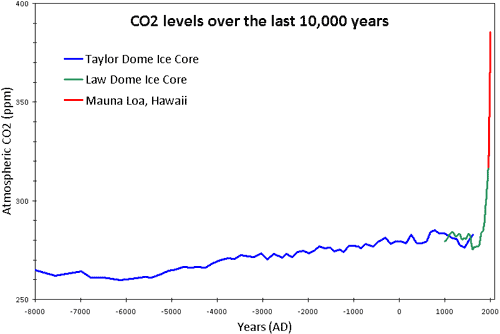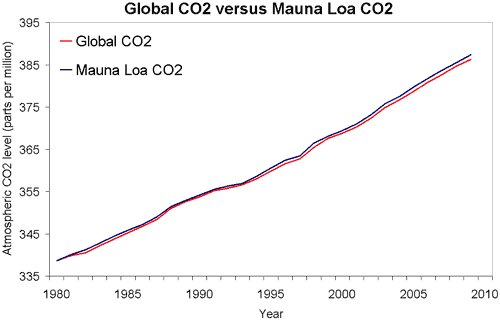The Dunning-Kruger effect and the climate debate
Posted on 15 February 2010 by John Cook
One of the best titles for a scientific paper has to be the Ig Nobel prize winning "Unskilled and unaware of it: How difficulties in recognizing one's own incompetence lead to inflated self-assessments". The paper compares people's skill levels to their own assessment of their abilities. In hindsight, the result seems self-evident. Unskilled people lack the skill to rate their own level of competence. This leads to the unfortunate result that unskilled people rate themselves higher than more competent people. The phenomenon is known as the Dunning-Kruger effect, named after the paper's authors, and is often seen in the climate debate. There are many with a cursory understanding who believe they're discovered fundamental flaws in climate science that have somehow been overlooked or ignored by climate scientists. Some take this a step further and believe they're being deceived.
Before anyone takes offense, let me begin with some disclaimers. I'm not saying the Dunning-Kruger effect is limited to one side of the debate. It's a universal human condition not confined to a particular ideology. When I first got into climate science discussions, I made my fair share of over-confident yet naive statements. As my understanding grew, I came to realise the complexities of climate science and how much more I have to learn (as predicted by Dunning and Kruger). I'm also not saying all skeptic arguments are a result of the Dunning-Kruger effect. However, a few examples demonstrate how the Dunning-Kruger effect can lead one astray.
In the discussion on whether CO2 is a pollutant, a graph was included to show CO2 levels over the last 10,000 years. The graph includes ice core data for CO2 levels before 1950. For values after 1950, direct measurements from Mauna Loa, Hawaii were used.

Figure 1: CO2 levels (parts per million) over the past 10,000 years. Blue line from Taylor Dome ice cores (NOAA). Green line from Law Dome ice core (CDIAC). Red line from direct measurements at Mauna Loa, Hawaii (NOAA).
A comment was posted querying the data in this graph. Here is the comment in full:
"Whoa, hold on a minute here. CO2 readings from ONE LOCATION prove we have an enormous GLOBAL spike in CO2 levels? You've got to be kidding me. This is science? That would be like me taking hydrological readings at the bottom of Lake Superior and then declaring that the entire surface of the earth must be covered with water based on my readings.
By the way, isn't Mauna Loa an active shield volcano? (http://en.wikipedia.org/wiki/Mauna_Loa) Hmmmm, you don't suppose that's where all that extra CO2 came from, do you? C'mon, people, wake up. I find it shameful that this obvious manipulation is allowed to pass as "proof". This is certainly NOT an unbiased scientific conclusion."
The commenter is asking whether it's appropriate to take CO2 readings from one location. Particularly when situated near a volcano which are known to emit CO2. Surely a better metric would be a global average of CO2 levels? These are legitimate questions. However, I deleted this comment as our Comments Policy allows no accusations of deception, whether the attack is directed towards skeptics, scientists or myself. This restriction is necessary to keep discussion constructive and restricted to science. Unfortunately, the comment began with a commendable question and ended with a not-so-commendable personal attack.
If the comment had stayed on methods and not strayed into motive, I would have posted the following response. Mauna Loa was used is because its the longest, continuous series of directly measured atmospheric CO2. The reason why it's acceptable to use Mauna Loa as a proxy for global CO2 levels is because CO2 mixes well throughout the atmosphere. Consequently, the trend in Mauna Loa CO2 (1.64 ppm per year) is statistically indistinguishable from the trend in global CO2 levels (1.66 ppm per year). If I used global CO2 in Figure 1 above, the result "hockey stick" shape would be identical.

Figure 2: Global atmospheric CO2 (NOAA) versus Mauna Loa CO2 (NOAA).
Unfortunately, this type of presumptive misunderstanding is seen all too often. Someone doesn't understand a certain aspect of climate science which is understandable considering the complexities of our climate. Rather than investigate further, they assume a flaw in the climate science or worse, an act of deception. This response is often more a reflection of the gap in their own understanding than any flaw in the climate science. For further demonstration, here are the two most common examples of the Dunning-Kruger effect in the climate debate.
The most common example is the argument, "why don't climate scientists look up and see that big, fiery ball in the sky - don't they realise the sun drives climate?" In actuality, climate scientists have noticed the big, fiery ball in the sky that provides almost all our climate's energy. Consequently, there are a multitude of peer-reviewed studies examining the sun's role in global warming. These studies have independently come to the conclusion the sun has not shown enough trend to have contributed significantly to recent global warming. More recent papers using the latest data have found the sun is actually moving in the opposite direction to climate. Eg - the sun has been cooling while the climate is warming.
The second most common example of the Dunning-Kruger effect is "don't climate scientists realise climate has changed naturally in the past?" If one peruses the peer-reviewed science, they'll find that yes, climate scientists do realise that climate has changed in the past. There is a whole field of science devoted to examining and understanding past climate change: paleoclimatology. And what scientists find in the Earth's past is that the planet is highly sensitive to changes in energy imbalance. When our climate loses or gains heat, positive feedbacks amplify the temperature change. This is one (of many) lines of evidence that tell us our climate is sensitive to CO2 forcing.
How does one counter the Dunning-Kruger effect, in others or in themselves? Dunning and Kruger propose that improving a person's skills helps them recognise the limitations of their abilities. If there's a question about an aspect of climate science, the first step should be to investigate and improve understanding of the science. Odds are climate scientists have investigated the same question in the peer-reviewed scientific literature. Use Google Scholar to find out papers on the topic. Or search on Skeptical Science (in case you didn't know, there's now a freely available iPhone app :-) If there's no direct answer, find the closest topic and post a comment asking for answers. There are many well informed regulars who would be happy to point you towards any relevant peer-reviewed papers.
UPDATE 16 Feb 2010: Many thanks to Peter for sending me the following YouTube movie which is an excellent visual depiction of changing CO2 levels over the last few decades:































 Arguments
Arguments






























Here is another way of looking at CO2 levels - with the CO2 axis going down to zero.
Re CO2 levels going back 500 million years, that is an interesting question all on its own and worthy of a few posts (in fact, we touch on it here and here).